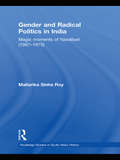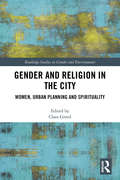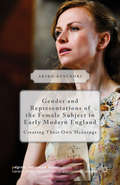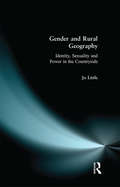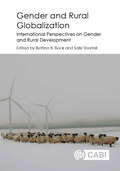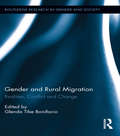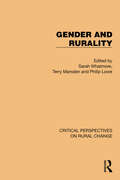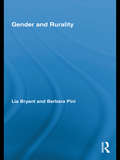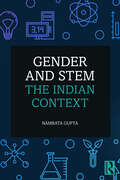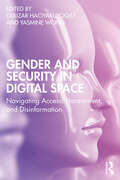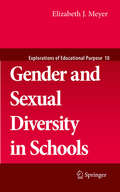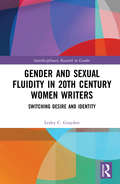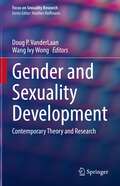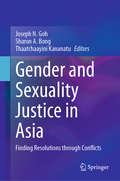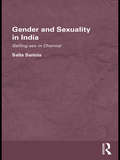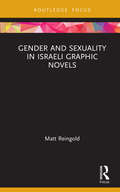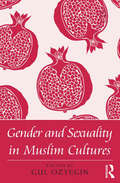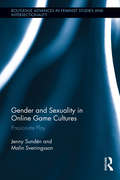- Table View
- List View
Gender and Qualitative Methods (Introducing Qualitative Methods)
by Pirkko Moisala Helmi Jarviluoma-Makela Anni Vilkko`The book will be of particular value to those wishing to understand and review the importance of gender within their research studies. It provides a clear and critical view of some of the social theories concerning gender, society and experience' - Nurse Researcher Gender and Qualitative Methods outlines the practical and philosophical issues of gender in qualitative research. Taking a social constructionist approach to gender, the authors emphasize that the task of the researcher is to investigate how gender/s is/are defined, negotiated and performed by people themselves within specific situations and locations. Each chapter begins with an introduction to a specific method and/or research subject and then goes on to discuss gender as an analytical category in relation to it. Areas covered include: field work; life story; membership categorisation analysis; and analysis of gender in sound and vision. Written in a clear and accessible way, each chapter contains practical exercises that will teach the student methods to observe and analyze the effects of gender in various texts and contexts. The book is also packed with examples taken from women and men's studies as well as from feminist and other gender studies.
Gender and Race in Antebellum Popular Culture
by Sarah N. RothIn the decades leading to the Civil War, popular conceptions of African American men shifted dramatically. The savage slave featured in 1830s' novels and stories gave way by the 1850s to the less-threatening humble black martyr. This radical reshaping of black masculinity in American culture occurred at the same time that the reading and writing of popular narratives were emerging as largely feminine enterprises. In a society where women wielded little official power, white female authors exalted white femininity, using narrative forms such as autobiographies, novels, short stories, visual images, and plays, by stressing differences that made white women appear superior to male slaves. This book argues that white women, as creators and consumers of popular culture media, played a pivotal role in the demasculinization of black men during the antebellum period, and consequently had a vital impact on the political landscape of antebellum and Civil War era America through their powerful influence on popular culture. "
Gender and Radical Politics in India: Magic Moments of Naxalbari (1967-1975) (Routledge Studies in South Asian History)
by Mallarika Sinha RoyThe Naxalbari movement marks a significant moment in the postcolonial history of India. Beginning as an armed peasant uprising in 1967 under the leadership of radical communists, the movement was inspired by the Marxist-Leninist theory of revolution and involved a significant section of the contemporary youth from diverse social strata with a vision of people’s revolution. It inspired similar radical movements in other South Asian countries such as Nepal. Arguing that the history and memory of the Naxalbari movement is fraught with varied gendered experiences of political motivation, revolutionary activism, and violence, this book analyses the participation of women in the movement and their experiences. Based on extensive ethnographic and archival research, the author argues that women’s emancipation was an integral part of their vision of revolution, and many of them identified the days of their activism as magic moments, as a period of enchanted sense of emancipation. The book places the movement into the postcolonial history of South Asia. It makes a significant contribution to the understanding of radical communist politics in South Asia, particularly in relation to issues concerning the role of women in radical politics.
Gender and Refugee Status
by Thomas SpijkerboerThis is the first comprehensive socio-legal study of the interrelation between gender and the law of refugee status. In the past decade, the issue has received increasing attention in academic writing, the media and the courtroom. This book contains an interdisciplinary analysis. The empirical data, collected for this study and not published previously, concerns Dutch asylum practice. The Netherlands is a prominent refugee-receiving country in Europe, yet hardly any English texts address Dutch refugee law. The book also covers foreign case law and academic writing. Therefore, the analysis is relevant for all refugee-receiving countries in the Western world; the empirical data on The Netherlands functions as a case study. The book combines perspectives of post-structuralist feminism and post-colonial studies. Refugee women are constructed as a double other. This intersectionality is related to the construction of the Third World as feminine (passive, in need of active outside intervention etc., etc.). The book provides a comprehensive overview of academic writing and of case law on the subject. On this basis of theoretical perspectives that were almost ignored until now, it develops an innovative critique of refugee law discourse and outlines its possible consequences for legal doctrine.
Gender and Relatability in Digital Culture: Managing Affect, Intimacy and Value
by Akane KanaiThis book explores the practices and the politics of relatable femininity in intimate digital social spaces. Examining a GIF-based digital culture on Tumblr, the author considers how young women produce relatability through humorous, generalisable representations of embarrassment, frustration, and resilience in everyday situations. Relatability is examined as an affective relation that offers the feeling of sameness and female friendship amongst young women. However, this relation is based on young women’s ability to competently negotiate the ‘feeling rules’ that govern youthful femininity. Such classed and racialised feeling rules require young women to perfect the performance of normalcy: they must mix self-deprecation with positivity; they must be relatably flawed but not actual ‘failures’. Situated in debates about postfeminism, self-representation and digital identity, this book connects understandings of digital visual culture to gender, race, and class, and neoliberal imperatives to perform the ‘right feelings’. Gender and Relatability in Digital Culture will be of interest to students and scholars across a range of disciplines including gender studies, cultural studies, sociology, and media studies.
Gender and Religion in the City: Women, Urban Planning and Spirituality (Routledge Studies in Gender and Environments)
by Clara GreedThis book provides a conceptual, historical and contemporary context to the relationships between gender, religion and cities. It draws together these three components to provide an innovative view of how religion and gender interact and affect urban form and city planning. While there have been many books that deal with religion and cities; gender and cities; and gender and religion, this book is unique in bringing these three subjects together. This trio of inter-relationships is first explored within Western Christianity: in Roman Catholicism, Protestantism, Eastern Orthodoxy and in the Pentecostal and Charismatic movements. A wider perspective is then provided in chapters on the ways in which Islam shapes urban development and influences the position of Muslim women in urban space. While official religions have declined in the West there is still a desire for new forms of spirituality, and this is discussed in chapters on municipal spirituality and on the rise of paganism and the links to both environmentalism and feminism. Finally, ways of taking into account both gender and religion within the statutory urban planning system are presented. This book will be of great interest to those researching environment and gender, urban planning and sustainability, human geography and religion.
Gender and Representations of the Female Subject in Early Modern England: Creating Their Own Meanings (Palgrave Shakespeare Studies)
by Akiko KusunokiThis book examines the interactions between social assumptions about womanhood and women's actual voices represented in plays and writings by authors of both genders in Jacobean England, placing the special emphasis on Lady Mary Wroth.
Gender and Rights (Key Concepts in Indigenous Studies)
by G. N. Devy Geoffrey V. DavisPart of the series Key Concepts in Indigenous Studies, this book focuses on the concepts that recur in any discussion of nature, culture and society among the indigenous. This book, the second in a five-volume series, deals with the two key concepts of gender and rights of indigenous peoples from all continents of the world. With contributions from renowned scholars, activists and experts across the globe, it looks at issues of indigenous human rights, gender justice, repression, resistance, resurgence and government policies in Canada, Latin America, North America, Australia, India, Brazil, Southeast Asia and Africa. Bringing together academic insights and experiences from the ground, this unique book with its wide coverage will serve as a comprehensive guide for students, teachers and scholars of indigenous studies. It will be essential reading for those in gender studies, human rights and law, social and cultural anthropology, tribal studies, sociology and social exclusion studies, religion and theology, cultural studies, literary and postcolonial studies, Third World and Global South studies, as well as activists working with Indigenous communities.
Gender and Rural Geography: Identity, Sexuality and Power in the Countryside
by Jo LittleGender and Rural Geography explores the relationship between gender and rurality. Feminist theory, gender relations and sexuality have all become central concerns of geographical research and significant progress has been made in terms of our understanding of both the broad relationship between gender and geography and the more detailed differences in the lives of men and women over space. The development of feminist perspectives and the study of gender relations in geography, has, however, been fairly uneven over the discipline. Both theoretical and empirical work on gender has tended to be concentrated within social and cultural geography. Moreover it has been directed largely towards the urban sphere.
Gender and Rural Globalization
by Bettina B. Bock Sally ShortallThis book explores how rural gender relations are changing in a globalized world. It analyses their development in specific places and the effects of the increasing connectedness and mobility of people. It integrates global experiences by discussing mobility, agriculture, gender identities and international development. Each theme is introduced with an overview of the state of the art in that specific area and integrates the case studies that follow. The contributors present empirical work from the global north and south and, more particularly, Sweden, Norway, Northern Ireland, Republic of Ireland, UK, Poland, Greece, Italy, Slovenia, Uzbekistan, India, Africa, Asia, Latin America, Australia, New Zealand, Canada and the USA. The first section explores gender differences in mobility patterns and analyses how mobility affects rural gender identities and relations. The second section focuses on the development of agricultural and rural policies, the response of individuals within farm households, and the implications for gender relations in rural areas. The third section focuses on the construction of identities and the changes occurring in the definition of rural femininity and masculinity as a result of rural transformations. The fourth section examines the role of international development policies in advancing women's well-being in the less developed parts of the world, and some of the unintended consequences of such interventions. The book closes with conclusions and reflections on the position of gender in rural research agendas and in rural academia more generally. Key features: #65533; Empircal work from a wide range of geographical areas #65533; Examines how gender identities are constructed in rural agriculture #65533; Considers how effective development policies are in improving women's well-being This book will be of interest to researchers in rural development and gender issues in the global North and South, and to students of rural sociology, social geography, development studies and gender studies.
Gender and Rural Migration: Realities, Conflict and Change (Routledge Research in Gender and Society #38)
by Glenda Tibe BonifacioGender and Rural Migration: Realities, Conflict and Change explores the intersection of gender, migration, and rurality in 21st-century Western and non-Western contexts. In a world where heightened globalization is making borders increasingly porous, rural communities form part of the migration nexus. While rural out-migration is well-documented, the gendered dynamics of rural in-migration - including return rural migration and the connectivity of rural-urban/global-local spaces - are often overlooked. In this collection, well-grounded case studies involving diverse groups of people in rural communities in Australia, Austria, Brazil, Canada, China, Norway, the United States, and Uzbekistan are organized into three themes: contesting rurality and belonging, women’s empowerment and social relations, and sexualities and mobilities. As demonstrated in this anthology, rural areas are contested sites among queer youth, same-sex couples, working women, young mothers, migrant farm workers, temporary foreign workers, in-migrants, and return migrants. The rich expositions of various narratives and statistical data in multidisciplinary perspectives by emerging and established scholars claim gender and rurality as nodal points in contemporary migration discourse.
Gender and Rurality (Critical Perspectives on Rural Change #6)
by Sarah Whatmore Philip Lowe Terry MarsdenOriginally published in 1994, this book brings together papers developing feminist analyses of the rural condition from a wide range of industrialised countries, informed by the national and local cultural constructions of gender and rurality which they interpret. The chapters address the gendered power relations of rural households and agricultural science; women’s mobilisation in farming and environmental politics; the intersection of domestic and rural values and practices as they shape gender identities.
Gender and Rurality (Routledge International Studies of Women and Place)
by Barbara Pini Lia BryantThe study of gender in rural spaces is still in its infancy. Thus far, there has been little exploration of the constitution of the varied and differing ways that gender is constituted in rural settings. This book will place the question of gender, rurality and difference at its center. The authors examine theoretical constructions of gender and explore the relationship between these and rural spaces. While there have been extensive debates in the feminist literature about gender and the intersection of multiple social categories, rural feminist social scientists have yet to theorize what gender means in a rural context and how gender blurs and intersects with other social categories such as sexuality, ethnicity, class and (dis)ability. This book will use empirical examples from a range of research projects undertaken by the authors as well as illustrations from work in the Australasia region, Europe, and the United States to explore gender and rurality and their relation to sexuality, ethnicity, class and (dis)ability.
Gender and STEM: The Indian Context
by Namrata GuptaThis book studies the prevalence of gender inequalities in the domains of science, technology, engineering, and mathematics (STEM) in India. It explores the paradox of an increasing number of women pursuing higher education in STEM fields while a relatively low percentage enter the job market. The book analyzes the factors that contribute to the loss of potential contributions from women in science. It underscores the need to understand the construction of masculinity and femininity, as well as male privilege and female disadvantage and how these concepts are associated with STEM.Lucid, topical, and rich in empirical data, this book will be indispensable for scholars and researchers of women’s studies, gender studies, sociology of science, science and technology studies, political studies and public policy. It will also be useful to policymakers, organizations, and professionals working in the STEM fields.
Gender and Scientific Discourse in Early Modern Culture (Literary And Scientific Cultures Of Early Modernity Ser.)
by Kathleen P. LongIn the wake of new interest in alchemy as more significant than a bizarre aberration in rational Western European culture, this collection examines both alchemical and medical discourses in the larger context of early modern Europe. How do early scientific discourses infiltrate other cultural domains such as literature, philosophy, court life, and the conduct of households? How do these new contexts deflect scientific pursuits into new directions, and allow a larger participation in the elaboration of scientific methods and perspectives? Might there have been a scientific subculture, particularly surrounding alchemy, which allowed women to participate in scientific pursuits long before they were admitted in an investigative capacity into official academic settings? This volume poses those questions, as a starting point for a broader discussion of scientific subcultures and their relationship to the restructuring and questioning of gender roles.
Gender and Security in Digital Space: Navigating Access, Harassment, and Disinformation
by Gulizar Haciyakupoglu Yasmine WongDigital space offers new avenues, opportunities, and platforms in the fight for gender equality, and for the social, economic, and political participation of women and marginalised communities. However, the very same space plays host to gender inequalities and security threats with gendered implications. This edited volume ventures into complexities at the intersection of gender, security, and digital space, with a particular focus on the persistent problems of access, harassment, and disinformation. Scholars and practitioners in this volume tackle various facets of the issue, presenting an array of research, experiences, and case studies that span the globe. This knowledge lends itself to potential policy considerations in tackling inequalities and threats with gendered implications in cyber space towards digital spaces that are safe and equal. This book is a must-read for students, scholars, and practitioners seeking to expand their knowledge on the gendered threats in digital space and potential remedies against them.
Gender and Self in Islam (Routledge Advances in Middle East and Islamic Studies #Vol. 10)
by Etin AnwarUsing philosophical analysis, this book explores the construction of gender in Muslim societies and its implication to the constitution of the self. The root of the existing discourse of the hierarchical principle is examined as is the extent to which the process of human reproduction, especially the role of women in conception, contributes to an anti-egalitarian theory of gender. The author analyzes the theological, cultural and political apparatus of the masculine conception of femininity and seeks to unfold the process of the alienation of the self from a woman’s sense of individuality, agency, and autonomy. Incorporating traditional Islamic sources, Western feminist texts and Christian texts, Gender and Self in Islam seeks to restructure the contradictory claims of gender hierarchy and egalitarianism and elaborate an alternative set of interpretations that is friendly and inclusive of women.
Gender and Sexual Diversity in Schools
by Elizabeth J. MeyerIssues related to gender and sexual diversity in schools can generate a lot of controversy, with many educators and youth advocates under-prepared to address these topics in their school communities. This text offers an easy-to-read introduction to the subject, providing readers with definitions and research evidence, as well as the historical context for understanding the roots of bias in schools related to sex, gender, and sexuality. Additionally, the book offers tangible resources and advice on how to create more equitable learning environments. Topics such as working with same-sex parented families in elementary schools; integrating gender and sexual diversity topics into the curriculum; addressing homophobic bullying and sexual harassment; advising gay-straight alliances; and supporting a transgender or gender non-conforming student are addressed. The suggestions offered by this book are based on recent research evidence and legal decisions to help educators handle the various situations professionally and from an ethical and legally defensible perspective.
Gender and Sexual Fluidity in 20th Century Women Writers: Switching Desire and Identity (Interdisciplinary Research in Gender)
by Lesley C GraydonThis book analyses twentieth-century writers who traffic in queer, non-normative, and/or fluid gender and sexual identities and subversive practices, revealing how gender and sexually variant women create, revise, redefine, and play with language, desires, roles, the body, and identity. Through the model of the "switch" —someone who shifts between roles, desires, or ways of being in the realms of gender or sexual identity – Gender and Sexual Fluidity in 20th Century Women Writers: Switching Desire and Identity examines the intersecting locations of gender and sexual identity switching that six prolific, experimental authors and their narratives play with: Gertrude Stein, Jeanette Winterson, Kathy Acker, Eileen Myles, Anne Carson, and Anne Carson’s translations of Sappho. The theory and identities revealed create and give space to—by their playful, exploratory, and destabilizing nature—diverse openings and possibilities for a great expansion and freedom in gender, sexuality, desires, roles, practices, and identity. This is a provocative and innovative intervention in gender and sexuality in modern literature and gives us a new vocabulary and conversation by which to expand women’s and gender studies, LGBTQ and sexuality studies, identity studies, literature, feminist theory, and queer theory.
Gender and Sexuality Development: Contemporary Theory and Research (Focus on Sexuality Research)
by Doug P. VanderLaan Wang Ivy WongThis book showcases a wealth of knowledge and insight on gender and sexuality development. With contributions from leading researchers, it covers a comprehensive set of topics at the forefront of the field and strikes a balance between traditional and emerging areas of study. Given that gender and sexuality are shaped by myriad influences, this book is modelled on an interdisciplinary perspective and delves into biological, comparative, psychological, cognitive, social, cultural, and clinical approaches. In so doing, this collection conveys the rich tapestry of gender and sexuality science and will hold value for many. For those already in the field, this book provides an excellent resource for brushing up on the latest and for inspiring the next phases of scientific investigation. Those who are newer to the field, including undergraduate and graduate students, stand to gain tremendously from not only the thoughtful and informative content, but also from the interdisciplinary approach modelled throughout the book. Beyond academia, this book is a valuable resource for clinicians and policy makers who deal with child and adolescent issues.
Gender and Sexuality Justice in Asia: Finding Resolutions through Conflicts
by Joseph N. Goh Thaatchaayini Kananatu Sharon A. BongThis book brings together a group of innovative scholars examining the contemporary issue of effecting gender and sexuality justice in the context of Asia, consonant with engendering a just, equitable and sustainable development for all. These grassroots initiatives are woven through three complementary sections of the book: gender justice in Asia, sexuality justice in Asia, and finding resolutions through conflict. The book foregrounds strategies that aim to call out and challenge existing gender and sexuality injustices with regard to women and the LGBTIQA+ community by: assessing the efficacy of gender mainstreaming policies through micro-credit schemes for women in East Java, Indonesia; proliferating the signifiers of the hijab (veil) by postmodern Malay-Muslim women or ‘Hijabistas’ within the consumerist culture of Malaysia; making visible the injustices of the Syariah legal system for non-Muslim women, and ground-breaking legislation that could potentially recognise same-sex marriages in Thailand; privileging the narratives of gay women diplomats within the highly masculinised field of diplomacy in the Asia-Pacific region; foregrounding the narratives of Filipino gay men, intimate partner violence among young Indonesian Christian young people, masculine-identifying lesbians in Singapore, young LGBT people in rural Vietnam, and a Chinese-Muslim Malaysian female-to-male transgender person; and proposing new ways of becoming an inclusive church through the radical act of befriending persons living with HIV and AIDS in Southeast Asia. This book celebrates diverse and inclusive voices and strategies of gender and sexual agents of change in envisioning and bringing to fruition a just and transformative society for all. It is of interest to students and scholars researching gender and sexuality in areas of development studies, international relations, socio-legal studies, and literary studies.
Gender and Sexuality in India: Selling Sex in Chennai (Routledge/Edinburgh South Asian Studies Series)
by Salla SariolaIndia has one of the highest numbers of HIV carriers in the world. HIV has remained associated with sex work, and large sums of money provided to fund public health interventions have come from global institutions such as UNAIDS, the World Bank and USAID. In the midst of these processes, however, sex workers and their everyday lives have been hidden behind the rhetorics of control and prevention. This book offers a detailed analysis of the experiences of sex workers in Chennai. Based on ethnographic fieldwork, it draws out themes of agency; notions of gender and sexuality; and the HIV prevention industry. While the women’s experiences are closely knit into the medical discourse regarding sex workers, sex work emerges as a complicated knot of poverty, desire, women’s oppression, love, co-option, and motherhood. The author examines how the sex workers actively negotiate the risks of their industry and suggests alternative discourses on women’s sexuality, sexual behaviour and desire, arguing that unless the power imbalances affecting women are addressed, such policies and activities will have little impact. She brings attention to the problems of current policies, discourses and attitudes regarding HIV, sexuality and sex work, and shows how new policies could help to reduce vulnerabilities not only for sex workers, but perhaps for all women in India.
Gender and Sexuality in Israeli Graphic Novels (Routledge Focus on Gender, Sexuality, and Comics)
by Matt ReingoldThis book explores how Israeli graphic novelists present depictions of masculinity and femininity that differ from conventional portrayals of gender in Israeli society, rejecting the ways that hypermasculinity and docile femininity have come to be associated with men and women. The book is the first to explore Israeli graphic novels through the lens of gender. It argues that breaking down existing gender delineations with regards to masculinity and femininity is a core feature of the Israeli graphic novel and comics tradition and that through their works, the authors and artists use their platforms to present a freer and looser conceptualization of gender for Israeli society. Undertaking close readings of Israeli graphic novels that have been published in English and/or Hebrew in the last 20 years, the book’s texts include Rutu Modan’s Exit Wounds and The Property, Ari Folman and David Polonsky’s Waltz with Bashir, Galit and Gilad Seliktar’s Farm 54, and Asaf Hanuka’s "The Realist". This book is of interest to students and scholars in comics studies, Israel Studies, Jewish Studies, and Gender Studies.
Gender and Sexuality in Muslim Cultures
by Gul OzyeginA must-read for anyone interested in Muslim cultures, this volume not only explores Muslim identities through the lens of sexuality and gender - their historical and contemporary transformations and local and global articulations - but also interrogates our understanding of what constitutes a ’Muslim’ identity in selected Muslim-majority countries at this pivotal historical moment, characterized by transformative destabilizations in which national, ethnic, and religious boundaries are being re-imagined and re-made. Contributors take on the most fundamental questions at the intersections of gender, sexuality, and the body. Several overarching questions frame the volume: How does studying gender and sexuality expand and enrich our understanding of Muslim-majority countries, historically and at present? How does the embodiment of ’Muslim’ identity get reconfigured in the context of twenty-first-century globalism? What analytical questions are raised about ’Islam’ when its diverse meanings and multifaceted expressions are closely examined? What roles do gender and sexuality play in the construction of cultural, religious, nationalistic, communal, and militaristic identities? How have power struggles been signified in and on the bodies of women and sexuality? How have global dynamics, such as the intensification and spread of neoliberal ideologies and policies, affected changing dynamics of gender and sexuality in specific locales? Here global dynamics touch down in diverse contexts, from masculinity crises around war disabilities, transnational marriages, and fathering in Turkey, Egypt, and Pakistan; to Muslim femininity narratives around female genital cutting, sexuality in divorce proceedings, and spouse selection; to gender crossing practices as well as protesting bodies, queering voices, and claims of authenticity in literary and political discourse. This book brings exciting research on these and other topics together in one place, allowing the essa
Gender and Sexuality in Online Game Cultures: Passionate Play (Routledge Advances in Feminist Studies and Intersectionality)
by Jenny Sundén Malin SveningssonHow do gender and sexuality come to matter in online game cultures? Why is it important to explore "straight" versus "queer" contexts of play? And what does it mean to play together with others over time, as co-players and researchers? Gender and Sexuality in Online Game Cultures is a book about female players and their passionate encounters with the online game World of Warcraft and its player cultures. It takes seriously women’s passions in games, and as such draws attention to questions of pleasure in and desire for technology. The authors use a unique approach of what they term a "twin ethnography" that develops two parallel stories. Sveningsson studies "straight" game culture, and makes explicit that which is of the norm by exploring the experiences of female gamers in a male-dominated gaming context. Sundén investigates "queer" game culture through the queer potentials of mainstream World of Warcraft culture, as well as through the case of a guild explicitly defined as LGBT. Academic research on game culture is flourishing, yet feminist accounts of gender and sexuality in games are still in the making. Drawing on feminist notions of performance, performativity and positionality, as well as the recent turn to affect and phenomenology within cultural theory, the authors develop queer, feminist studies of online player cultures in ways that are situated and embodied.


